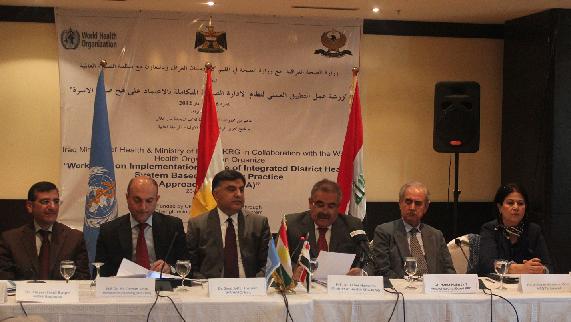 26 March 2012 – The Ministry of Health of Iraq and the Ministry of Health of the Kurdistan Regional Government, Iraq, in collaboration with the World Health Organization (WHO), are organizing a four-day workshop on the integrated district health system based on the family practice approach from 26 to 29 March in Erbil. The workshop will focus on the planning and implementation phase, based on analysis, discussions and findings of the health system assessment of the four pilot districts – Baghdad, Erbil, Missan and Kirkuk. The main objectives of the workshop are to: present and discuss the findings from the health system assessment in the four pilot districts; identify and agree on priorities for each district; establish a mechanism for implementation of interventions; reach a consensus on the 2012–2013 action plan and the expected results for each district; and develop a plan of action on family practice implementation for the Erbil district.
26 March 2012 – The Ministry of Health of Iraq and the Ministry of Health of the Kurdistan Regional Government, Iraq, in collaboration with the World Health Organization (WHO), are organizing a four-day workshop on the integrated district health system based on the family practice approach from 26 to 29 March in Erbil. The workshop will focus on the planning and implementation phase, based on analysis, discussions and findings of the health system assessment of the four pilot districts – Baghdad, Erbil, Missan and Kirkuk. The main objectives of the workshop are to: present and discuss the findings from the health system assessment in the four pilot districts; identify and agree on priorities for each district; establish a mechanism for implementation of interventions; reach a consensus on the 2012–2013 action plan and the expected results for each district; and develop a plan of action on family practice implementation for the Erbil district.
H.E Dr Majeed Hamad Amin, the Minister of Health of Iraq, stated in the inaugural session of the workshop that, “Improving the performance of the integrated district health system based on the family practice approach will ensure universal, equitable and efficient access to essential health services for every individual, especially the most vulnerable, including children, women and older persons, residing in the catchment population of a primary health care facility”.
H.E Dr Taher Hourami, Minister of Health of the Kurdistan Regional Government, acknowledged completion of the assessment process in the four pilot districts and said, “Use of this baseline information will contribute to informed decision-making, especially during prioritization of needed interventions at district level and will promote a culture of evidence-based decision-making”. H.E thanked WHO for their support to the Government of Iraq in the provision of best technical expertise, guidelines and tools. He said, “We have a golden opportunity to enhance the access of quality health services to the Iraqi population through the timely and well-planned implementation of this initiative”.
Dr Ali Sindi, Minister of Planning of the Kurdistan Regional Government-Iraq appreciated the initiative of WHO to assist the MOH of KRG in the implementation of integrated district health system based on family practice approach and assured WHO about the strong commitment of Government of KRG to support the family practice initiative in KRG. And said “ the adoption of family practice approach is going to pave the way towards a successful reform of the health care delivery system as well as enable us to achieve tangible improvement in the health status of population”.
WHO Representative for Iraq, Dr Syed Jaffar Hussain, said that following completion of the health system assessment for the four selected districts, a comprehensive report highlighting the district health system profile of each district had been prepared. The data collected through assessment would provide the Ministry of Health and district health managers with information to assess the functioning of the existing system, identify strengths and weaknesses, establish priorities, select interventions and set programme objectives and targets in support of the integrated district health system initiative.
The workshop will be attended by 55 high-level delegates representing ministries of health at central, governorate and district levels and representatives of UNICEF, the United Nations Population Fund, United States Agency for International Development, European Commission and the media. Senior staff from the WHO Regional Office for the Eastern Mediterranean, Iraq, Jordan and Lebanon country offices will facilitate the workshop.
Dr Hussain praised the strong commitment of the Government of Iraq for making this initiative a core strategy for enhancing the performance of the health system at both national and district levels to improve the health status of the population. He reaffirmed the technical support of WHO to further strengthen the primary health care system, and in close collaboration with other partners, contribute to the capacity-building needs of human resources for health, required to accomplish the successful implementation of the integrated district health system based on the family practice approach in Iraq.




